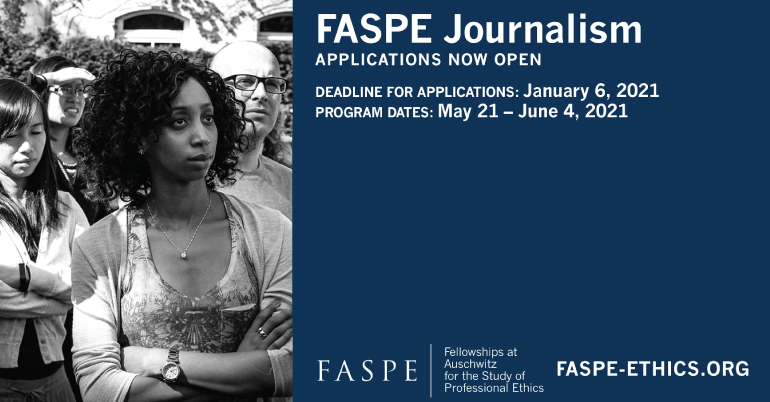FASPE is an intensive, two-week study program in professional ethics and ethical leadership. FASPE is neither a Holocaust studies course, nor a genocide prevention program. Rather, the curriculum is designed to challenge Fellows to critically examine constructs, current developments and issues that raise ethical concerns in their professions in contemporary settings in which they work.
FASPE Journalism challenges its Fellows to recognize their responsibility to act as ethical leaders in their careers in journalism and the media. FASPE begins by examining the actions and choices of German and international journalists in covering and supporting Nazi policies. FASPE then draws on this historical example to help Journalism Fellows grasp their role and responsibility as individuals with influence in their communities and to lead them to identify and confront the ethical issues currently facing journalists and media institutions at large.
Looking for fully-funded opportunities, install the Youth Opportunities Android or iOS App here.
Each year, FASPE Journalism awards fellowships to 14 to 16 journalism students and early-career journalists. Fellows spend two weeks in Berlin and Poland, where they visit key sites of Nazi history and participate in daily seminars led by specialized faculty. The program couples the power of place with academic rigor and many informal opportunities for creative exchange.
FASPE draws on a large pool of applicants, whose diverse backgrounds and interests enrich discussions both inside and outside the seminar room. Journalism Fellows travel with Business and Law Fellows, allowing them to broaden their understanding of the role of professionals over shared meals and activities and in several interdisciplinary seminars. FASPE Fellowships are fully funded so that financial ability does not affect participation.
Location:
Germany, PolandBenefits
- FASPE Journalism awards fellowships to 14 to 16 journalism students and early-career journalists.
- Fellows spend two weeks in Berlin and Poland, where they visit key sites of Nazi history and participate in daily seminars led by specialized faculty.
- The program couples the power of place with academic rigor and many informal opportunities for creative exchange.
- Journalism Fellows travel with Business and Law Fellows, allowing them to broaden their understanding of the role of professionals over shared meals and activities and in several interdisciplinary seminars.
- FASPE Fellowships are fully funded so that financial ability does not affect participation.
Eligibilities
- FASPE Journalism applicants must be interested in journalism as a career and fit into one of the following two categories: 1) be enrolled in a graduate program of any kind and planning to work as a journalist; 2) be working as a journalist with an undergraduate degree in any field received between May 2015 and May 2020 or a graduate degree in any field received between May 2019 and January 2021.
- FASPE seeks Fellows who are about to embark on their career as professionals, are interested in engaging in discussions with their co-Fellows and faculty, and who have the intellectual and emotional maturity to unpack difficult and controversial issues responsibly and respectfully in small group settings.
- FASPE selects its Fellows on the basis of their academic background, personal and professional experiences, capacity for leadership and ability to contribute to the program and the alumni community. All applications are welcome and reviewed.
Application Process
- All applications must be submitted through the FASPE Submittable application portal through the Apply Now link.
- To ensure that you have the smoothest experience in applying, please be sure to first read through all instructions on the official link.
- Online form
The online cover form on Submittable will ask for basic information about you. This will include your contact information, schools you have attended and the names and contact information for those writing letters of recommendation and those serving as references. - Resume
Your resume should include your educational and employment history, along with any honours, awards and/or publications. - Transcripts
They require transcripts from all institutions of higher education where you spent significant time. (There is no need to send transcripts from a semester abroad or for a single summer course.) You may submit official electronic transcripts or scans of official hard copy transcripts. Printouts and screenshots of online transcripts are not acceptable. If you are in your first year of a program and are unable to submit a transcript because your grades are not yet reported, please submit a letter from your dean confirming your enrollment in your degree program, confirming that you are a student in good standing, and, ideally, including a list of the classes you are currently taking. Please note that a school admissions letter or a letter from your registrar that does not include your degree program is not acceptable as proof of enrollment. - Short Essay Questions
They require responses to short essay questions. The questions depend on program; and the requested length of each essay is indicated within the questions.
Looking for fully-funded opportunities, install the Youth Opportunities Android or iOS App here.
Application Deadline: January 7, 2021
Application ClosedOfficial link









